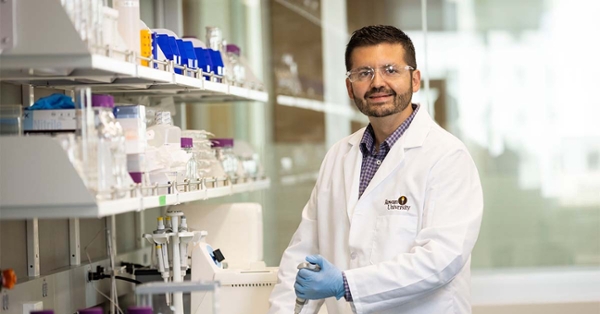NSF CAREER Award: Rowan researcher takes aim at critical barrier in regenerative medicine
NSF CAREER Award: Rowan researcher takes aim at critical barrier in regenerative medicine

In humans, mesenchymal stem cells (MSCs) live in bone marrow and body fat. Their “identity” can be defined by their ability to divide into more stem cells, adapt to new environments and differentiate into specialized cells that produce tissues like bone, ligament, cartilage and fat.
When studied in the lab, these unique properties decline over time. The inability to produce large quantities of MSCs with their identity intact is a critical barrier that limits the use of these cells for reproducible research and stem cell therapies.
Sebastián L. Vega, Ph.D., an assistant professor of biomedical engineering at Rowan University, has received a five-year, $512,890 CAREER Award from the National Science Foundation (NSF) to investigate why stem cells lose their identity outside the body. The Faculty Early Career Development (CAREER) Program offers the independent federal agency’s most prestigious awards to early-career faculty. Vega has dual appointments in the Henry M. Rowan College of Engineering and the Rowan-Virtua School of Translational Biomedical Engineering & Sciences, where he is also a founding faculty member of the Rowan-Virtua Institute of Regenerative Medicine and Transplantation.
“Using stem cells, scaffolds and environments to grow functional tissue—a replacement of a person’s own tissue—is the future, with treatment strategies beginning to be available to patients now,” said Mark Byrne, Ph.D., founding dean of the Rowan-Virtua School of Translational Biomedical Engineering & Sciences. “Dr. Vega’s research is critical to improving and scaling stem cell therapies, which lead to much better outcomes for patients. At Rowan, we actively recruit top researchers like Dr. Vega, who have high potential to lead next-generation treatment strategies.”
“This award recognizes Dr. Vega’s exceptional research and the promise of future breakthroughs associated with stem cell manufacturing,” said Giuseppe Palmese, Ph.D., dean of the Henry M. Rowan College of Engineering. “We are delighted to have Dr. Vega represent our college in this way.”
Funding from Vega’s CAREER Award will be used to develop materials with independently controllable properties to understand the role of stiffness, adhesion and the interactions between cells on MSC identity.
“MSCs are typically grown in plastic petri dishes, which are stiffer than any tissue in the human body,” Vega said. “MSCs ‘remember’ their culture history and prolonged exposure to unnatural materials like plastic negatively impacts their ability to divide, adapt and differentiate.”
Instead of relying on traditional petri dishes for culturing cells, Vega is designing a replacement—softer, bioactive materials meant to preserve the cells’ identities even after countless cell divisions in the lab. The goal is to create materials that can be used to culture large populations of high-quality stem cells for research and clinical use.
Another unwanted side effect of prolonged exposure of these cells to plastic is a loss of cell-material communication, which is necessary for taking on the properties of specialized cell types they’re meant to become. The team will develop new culture environments with prescribed properties to significantly improve MSC adaptation to biomaterials used in regenerative medicine.
“Despite being discovered over half a century ago and having become one of the most-studied cell types in regenerative medicine, FDA-approved MSC therapies do not exist,” Vega said. “Our proposed research will help overcome cell manufacturing challenges seen in many MSC clinical trials and I am hopeful that our studies will enable the clinical use of MSCs in tissue engineering and to treat degenerative diseases.”
This award will also integrate research with ongoing educational outreach activities. Vega is the founder of BEAM (BioEngineering and Me), a program that exposes high school students to biomedical engineering. Through this program, Glassboro High School students learn about biomedical engineering through research talks and interactive activities in research labs. To reach more students, Vega developed the annual BEAM Summer Program, a free, two-week summer program open to any high school student nationwide. To date, 74 high school students from nine states have participated.
Vega also runs the RISER (Research Immersion in biomedical Science & Engineering at Rowan) Summer Program, a six-week research experience for high school students to join biomedical engineering or biomedical science labs, which culminates with student presentations at the annual RISER Summer Symposium.
“CAREER awards from the National Science Foundation support early career researcher educators in attaining their long-term goals,” said NSF program director Wendy Crone. “Dr. Vega's project on regulating stem cell proliferation, mechanical adaptation, and differentiation is poised to make advancements in the ability to preserve stem cell identity while also engaging high school and undergraduate students with biotechnology research.”